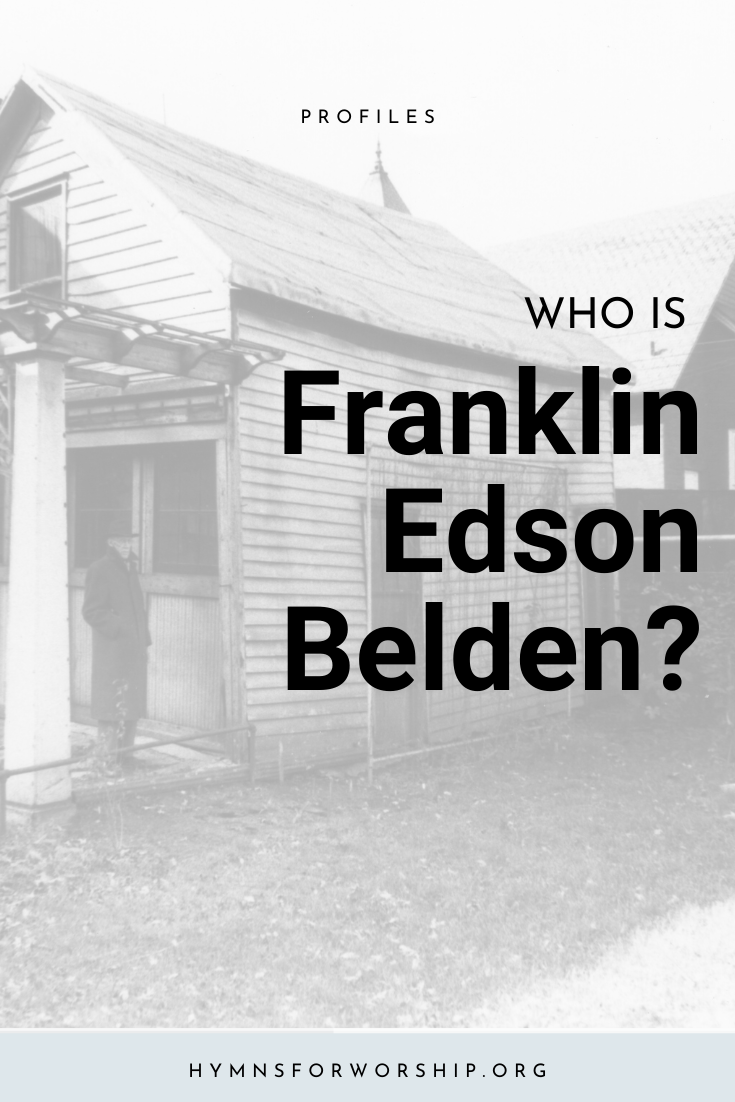The history of the Seventh-day Adventist church is abundant with stories of great men who after making indelible contributions to the Advent movement, left the church. A few prominent names come to mind — T.M. Preble who was instrument in introducing the Sabbath truth to Joseph Bates; O.R.L. Crosier who wrote concerning the sanctuary; D.M. Canright, a leading Seventh-day Adventist evangelist and at one time a conference president; A.T. Jones and J.H. Waggoner, presentors of the Righteousness by Faith messages in 1888; J.H. Kellogg, a brilliant physician and leader in health reform.
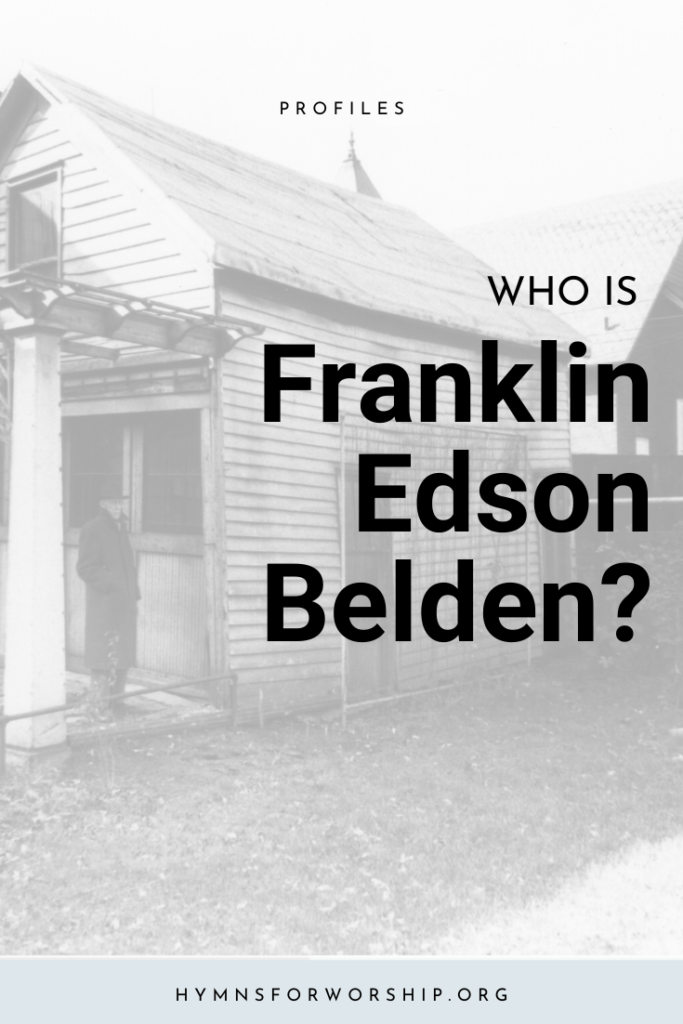
To this list we must add a musician known among the Seventh-day Adventists as its most prolific hymn writer, Franklin E. Belden. Today, many of his hymns are still sung and well-beloved. His compositions occupy such a big part of the Adventist hymnody simply because of its relevance and singability. Yet as dynamic and well-known Belden’s hymns are, there is really little that we know about his personal life.
[su_divider top=”no” divider_color=”#d6d6d6″ link_color=”#976731″ size=”1″ margin=”10″]
From A Prominent Family Tree
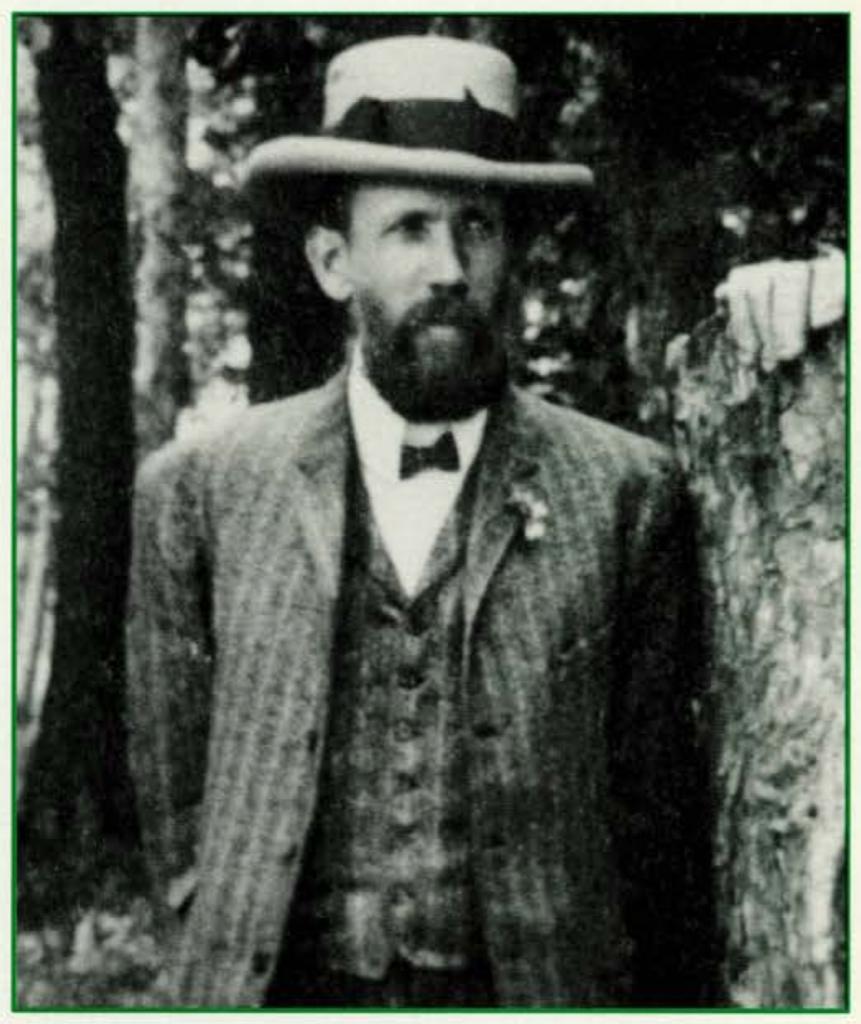
Franklin Edison Belden comes from a lineage of people who had a very active part in the advent movement. His grandfather, Albert Belden hosted the first Sabbath Conference in his home at Rocky Hill, Connecticut. He was one of the few who stayed on after the Great Disappointment in 1844. Anxious to know more about the truth, Albert opened his home to Bible studies, conferences, and at one point, provided lodging for James and Ellen White.
Hence it was at the Beldens’ that many significant events in the Adventist history happened. It was there where Ellen White received the vision about the sealing (See Life Sketches, 116-19) and where James White published the first paper of the movement called “The Present Truth.” Other personal events also occured there, one of them being the birth of their second son, James Edson.
The Whites and the Beldens developed a deep relationship as they worked and lived together. Albert’s son, Stephen, father of Franklin, was James White’s apprentice in printing the Sabbath pamphlets. In this way he was able to meet Ellen White’s older sister, Sarah Harmon. They married and moved to Battle Creek in 1862, shortly after the publishing house was transferred to the same location, also partly because of the ‘undue attention drawn to them as a result of their familial relationship to Ellen White.’ (Fortin, Ellen G. White Encyclopedia).
[su_divider top=”no” divider_color=”#d6d6d6″ link_color=”#976731″ size=”1″ margin=”10″]
The Belden Family — Faithful Workers for God
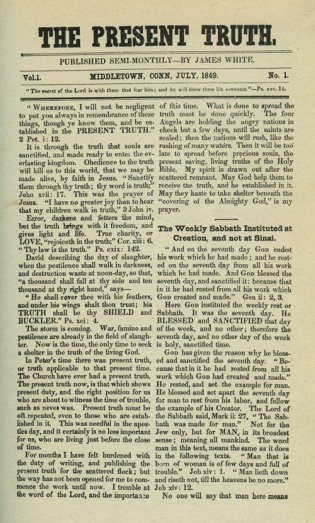
As it was the case for many of the pioneers, Sarah became sick with consumption. When her situation worsened, the Belden family decided to move back to Connecticut to be closer to other relatives. On her deathbed, she urged each of her children to commit their lives to the Lord, and all of them promised to do so.
Sarah and Stephen were hard workers for the cause of truth. When Sarah died, part of her obituary described her as someone whose “… faith has ever been unshaken in that movement’s being the work of God in the fulfillment of His word…” In her younger years, she was known to have worked as a hired servant, earning $1.50 a week. She would then give all her earnings towards Elder Joseph Bates so he can go to Vermont and preach the three angels’ messages.
Stephen remarried and died years later, at age 77, as a missionary in the South Sea Islands. When he died, the man who officiated the burial commented, “Mr. Belden was greatly respected by everybody on the island, and they all felt that it was a great calamity that so good and useful a man should be taken away.”
Byron, one of the five children born to Stephen and Sarah, was also a consecrated man. An Advent pioneer in Australia, he and his wife were also involved in the publishing work. He was an efficient pressman, Bible worker and colporteur. His obituary described him as a man whose “whole heart was in the work of the Master, so that even a sense of his physical weakness could not deter him from pursuing it to the last.”
[su_divider top=”no” divider_color=”#d6d6d6″ link_color=”#976731″ size=”1″ margin=”10″]
Finding His Own Way
At sixteen years of age, Franklin returned to Battle Creek to attend college. To pay for school, he worked part-time for the Review and Herald. After college, he moved to California in 1875 to work with Pacific Press, where his cousin James Edson White was also working. It was around this same time when the two men also collaborated, together with D.S. Hakes in producing a hymnal called, the Song Anchor.
After a few years, Franklin decided to make another move, this time to Colorado. Hoping to recover from his developing bronchitis, he set out in full hope that he would regain his health. There he also met his future wife Harriet Mc Dearman, sister of Edson White’s wife, Emma MacDearman. They were married April 24, 1881 and had one daughter, Linnie Louise, who was born on December 19, 1882.
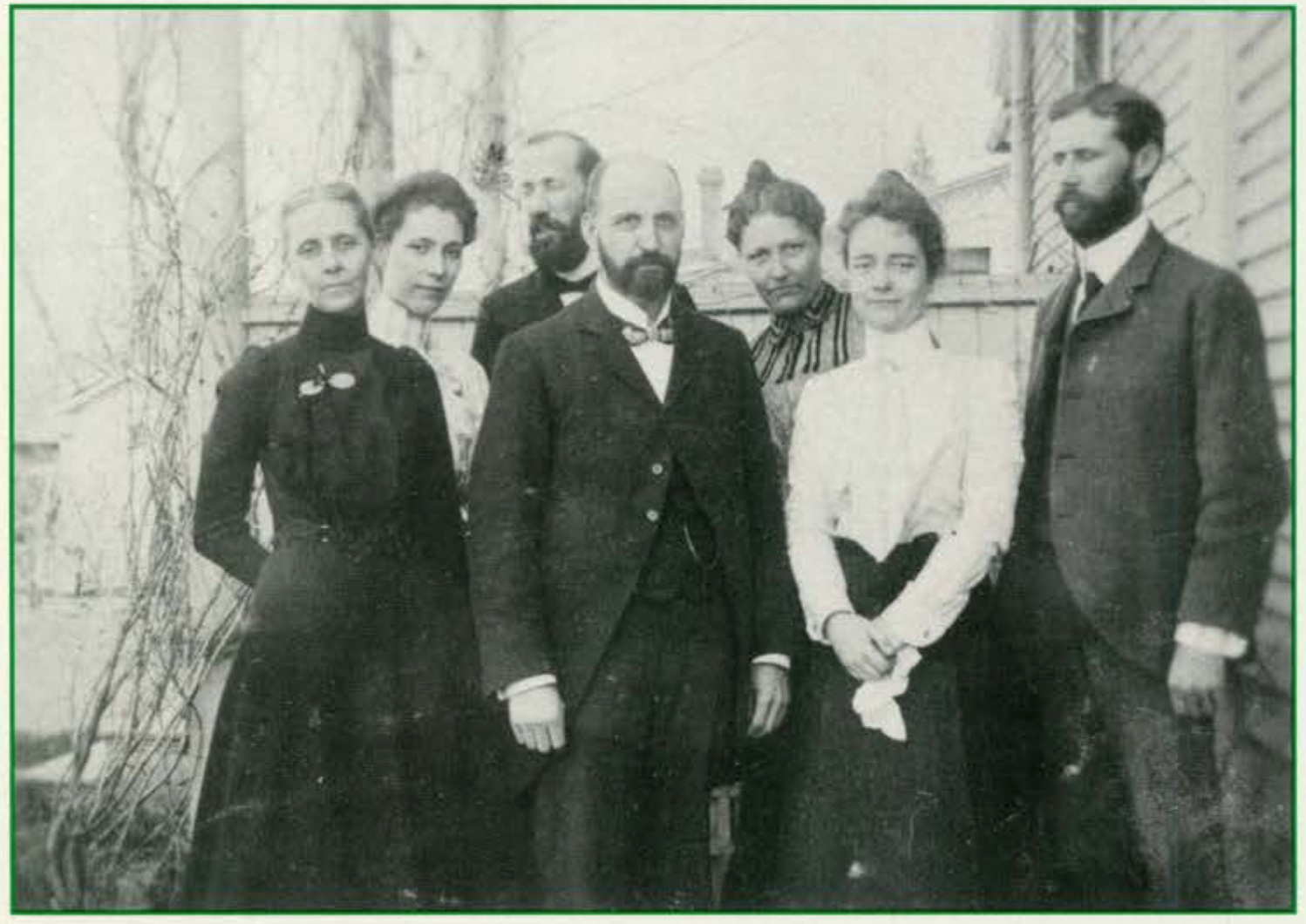
On several occasions, Ellen White would show concern over Franklin’s spiritual state. She counselled that he had a ‘headstrong, unteachable spirit,’ that he needs to be serious about his Sabbath observance, and that he lacked good financial management.
[su_divider top=”no” divider_color=”#d6d6d6″ link_color=”#976731″ size=”1″ margin=”10″]
“Music Was His Life”
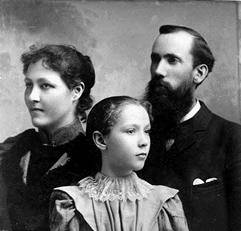
When asked to describe their activities in Colorado as a family, Linnie wrote,
“While still in Colorado my father and mother worked at all camp meetings writing and singing songs. Father would compose after the minister announced his text. By the time the minister had finished, my father and mother would stand forth and sing the song written only on a piece of paper. Mother was a great help in Dad’s musical career. Music was his life.”
Letter of Linnie Belden to W.C. White
From this detailed description, one can see as much musical talent with Harriet as well. She obviously had a knack for sight-singing, given that she could perform at a moment’s notice.
Franklin received most of his musical training from his father. Stephen Belden was known to be fond of music and was taught in several music schools in his younger years. In an article from Union Conference Record, December 3, 1906, G.B. Starr wrote that Franklin said he “owes all he has been able to accomplish in the musical line, under God, to the faithful teaching of his father, which continues to be an inspiration to him.”
This musical talent initially proved to be useful for the cause of the Advent movement. It was through Franklin’s efforts, together with Edwin Barnes, that the monumental Hymns and Tunes was printed. This was the first hymnal officially put together under the direction of the General Conference in an effort to promote congregational singing. In this hymnal, many of Franklin’s 80 hymn texts and 87 hymn tunes were incorporated. In relation to this work, an agreement ensued between Franklin and the General Conference that part of the royalties would go towards mission endeavours.
[su_divider top=”no” divider_color=”#d6d6d6″ link_color=”#976731″ size=”1″ margin=”10″]
Disagreements and Separation
The job of putting together Hymns and Tunes marked Franklin’s climb to being a voice of authority within the music and publishing work of the Seventh-day Adventists in Battle Creek. His next project was preparing Bible Readings for the Home Circle for Publication. The next couple of years were spent training colporteurs, promoting Adventist publications as a book agent for Michigan and for the General Conference.
The years 1886-1892 were very productive years for him, yet unfotunately as recorded in history, it did not really become beneficial to the long-range goals of the church.
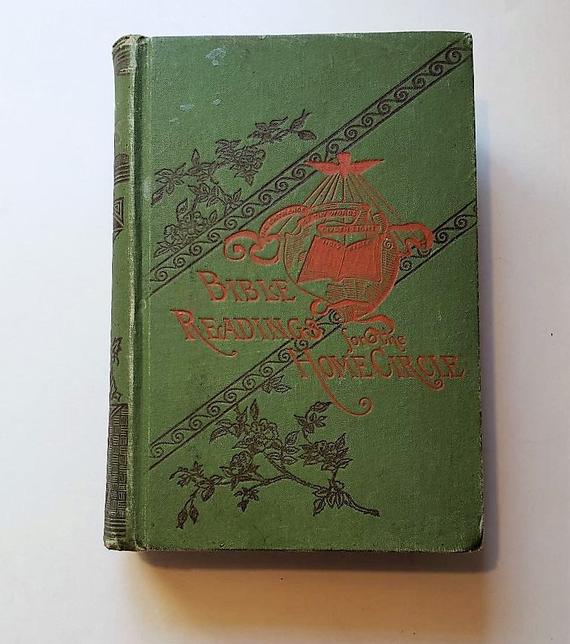
Adopting the policy of promoting only one book at a time for sale by colporteurs, F.E. Belden was able to effectively hinder the circulation of The Great Controversy and The Patriarchs and Prophets by designating Bible Readings as the one book to be promoted.
At the turbulent 1888 General Conference Session, Franklin was among the main forces in questioning Ellen White’s prophetic gift. Holding an authoritative position, Belden was able to sway the committee to require all ministers to be colporteurs, against Ellen’s advise. Following these sessions, Franklin continued to to work against his aunt. Adopting the policy of promoting only one book at a time for sale by colporteurs, he was able to effectively hinder the circulation of The Great Controversy and The Patriarchs and Prophets by designating Bible Readings as the one book to be promoted.
The years after 1888 marked Franklin’s deep pursuit of business and commercial concerns that it gradually eclipsed his spiritual priorities. As a result, he became increasingly disillusioned with his job, never really fully understanding the real nature of his work. Although holding an executive position, he felt it would be an advantage for him to leave the Review and Herald. This decision was followed with a series of lawsuits against the church.
In 1900, during the time Franklin was preparing the Christ in Song hymnal, Ellen White invited him to be one of her literary assistants. It seemed evident to many, including the prophetess, that he had a spiritual revival and was ready to work with the church again. The rift between Ellen White and Franklin seemed to have dissipated but his animosity and disdain towards Willie, Ellen White’s son, remained. In reaction to this, Ellen wrote in a letter,
I was willing to try you [Frank] in my work, but I can never, never place my work entirely in your control. Your criticism of W.C. [White], whose work bears the test of years, is cruel and unjust.
Letter 94, 1901
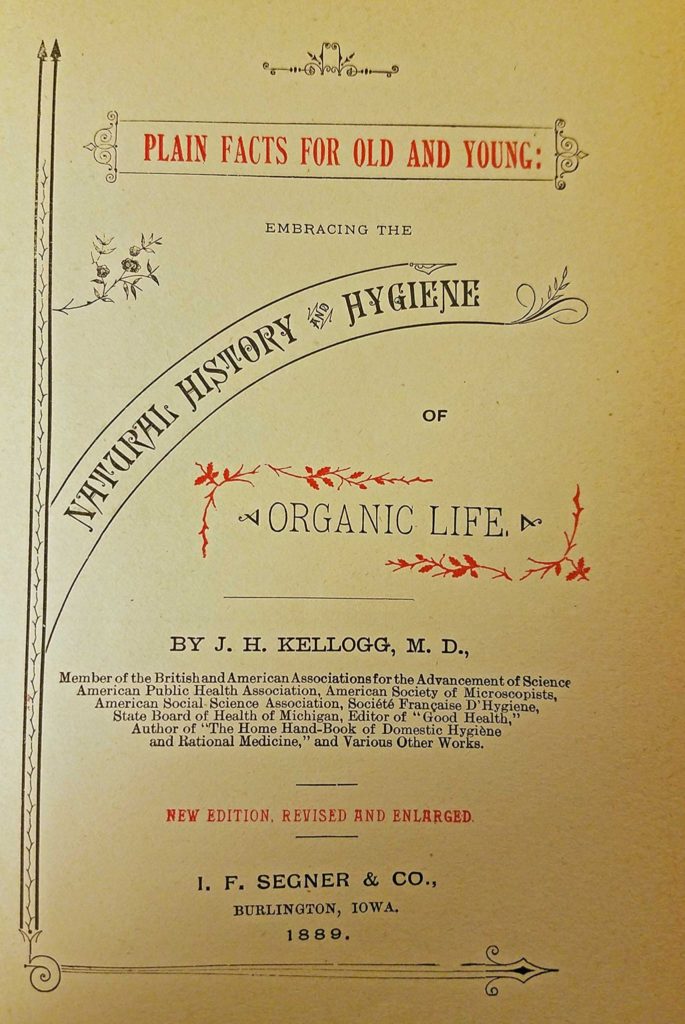
Plain Facts for the Old and Young, a book that gives advice about sex, reproduction, celibacy, masturbation, marriage, childbirth, venereal disease, promiscuity, and menopause. 
Dr. John Harvey Kellogg
Claiming this as the reason for not working with Ellen White, Franklin made a pivotal move to work with Dr. J.H. Kellogg instead in circulation of his book, Plain Facts for the Old and Young. His connection to Kellogg only intensified his feelings, not only against his cousin, W.C. ‘Willie’ White, but sadly against his aunt as well.
Thoroughly embittered with his experiences with the denomination, he finally separated himself permanently from the Seventh-day Adventist Church in 1907.
[su_divider top=”no” divider_color=”#d6d6d6″ link_color=”#976731″ size=”1″ margin=”10″]
A Motherly Concern
Ellen White had a tender regard for his nephew from the beginning. The numerous letters filled with divine counsel, reproof, warnings, and entreaties over the years showed Mrs. White’s deep concern for Franklin’s salvation. Her letters especially increased the same year Franklin withdrew himself from the church.
A letter dated February 6, 1907 read,
You are in danger of overestimating your own value. So long have you followed plans of the enemy’s devising, that you seem powerless to break the spell, or to resist evil influences. In the name of the Lord I ask to seek the Lord with all the power at your command. Repent, and be rebaptized, that you may act a part in union with Christ as a laborer together with God. Just as long as you seek to have your own way, trying to serve God and mammon, you will continue your record of mistakes and failures. You have now an opportunity to redeem the past, but nothing will avail you short of a complete surrender to God. Do not continue to make war against those whom you suppose ought to help you and favor you. Those who cherish a spirit of warfare against those who might help them will never find their way out of perplexities, or be free from the deception of Satan. Why should you continue in an evil way, even though others may have treated you unjustly?….
Another letter dated February 9, only three days after the previous letter
My dear nephew Frank Belden, Your case is still kept before me. You are passing through the most perilous period of your life history. For years Satan has exercised his power over you, but I am praying that the spell may be broken, and that you may now take your stand on the Lord’s side…You have lost the power of clear spiritual discernment, and your mind is changeable. Yet you do not perceive your peril. You are in danger of making moves that will result in your ruin. I do not want you to make shipwreck of faith. I desire to see you seeking the Lord while He may be found, and calling upon Him while He is near. You are not happy. Will you not, for the sake of Him who gave His life for you, surrender to the Lord? Will not you and your family renew your covenant with Him? Do not delay; for delay is dangerous.
The following day, Ellen White continued to write,
Last night again I had a representation of your case. I awoke at twelve o’clock and could not sleep longer. My soul was greatly burdened as I prayed for you. Your condition was opened before me and your determination to have your own way. This determination should be overcome. For God so loved the world, that He gave His only begotten Son, that whosoever believeth in Him should not perish, but have everlasting life.” [John 3:16.] Will you consider this?
The last recorded letter was dated June, 1908
My dear Nephew: Once more I make my appeal to you. You are my sister’s son—the child of one who unselfishly did the work of the Lord. Will you not now turn square about?…At different times you have sent documents to me to read. I have read a few pages, and then…the word of the Lord came to me, ‘It is a mixture of such a character that no human mind could understand it. Frank Belden is serving his own unsanctified heart. He does not understand his own spirit, and he never will, unless he is converted. Unless he is born again, he will never be permitted to pass through the gates of the holy city. His whole mind and soul will have to be renewed before he can be perfect in righteousness. He has caused great perplexity to those who are trying to work in truth and righteousness. He can never untangle the perplexities he has made for others and for himself. If he would give himself to the Lord by covenant, God would let His light shine into his perplexed, confused mind…’In writing this, I have relieved my soul. Break the bands with which Satan has bound you. This you must do before you can enter into covenant relation with God.
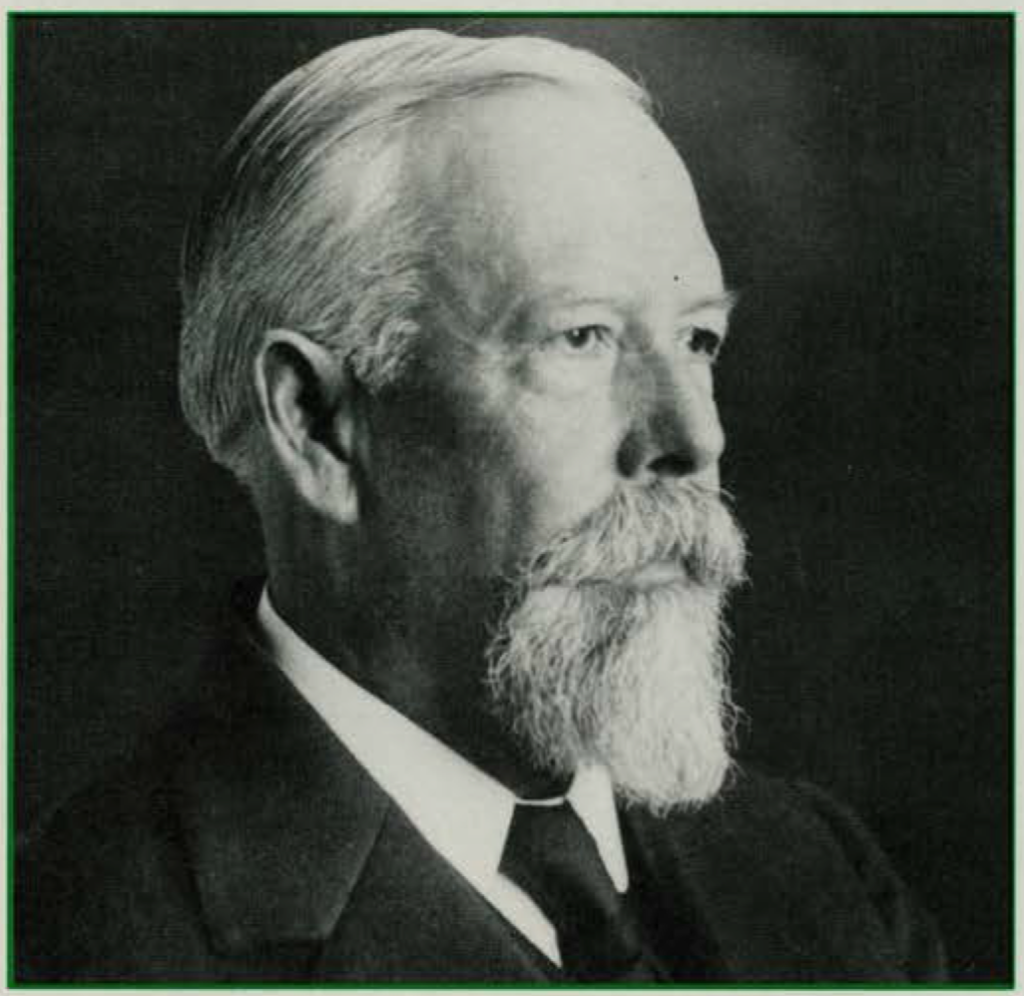
Apparently, her letters were met with an unreceptive heart. Many writers have described him to have remained bitter, hostile and critical towards the end of his life.
The last time Willie White visited him, Belden ordered him off the premises.
In another instance, Kenneth Wood, then a young pastor in Cleveland Ohio and Carlyle Haynes, a GC departmental director, visited shortly before he died. He did not want to let them in but changed his mind. Before they left, Wood and Haynes asked if they could offer a short prayer. Belden replied, “Not so long as you believe in that old woman,” pertaining to the writings of Ellen White.
He died a few weeks later, an unconverted man.
[su_divider top=”no” divider_color=”#d6d6d6″ link_color=”#976731″ size=”1″ margin=”10″]
What About His Songs?
What remains about him now are his songs. If you’ve been an Adventist for several years, you have probably sung some of his songs at one point. Many of these hymns are rich in doctrinal content, and largely relevant with the unique beliefs of the Adventist faith.
But how do we treat the messages they convey, in the light of some of the things you just read about?
(To be continued)
ALSO READ:
Minneapolis — 1888: The Forgotten Issue, “The Case of Franklin E. Belden.” (EGW Research Documents)

